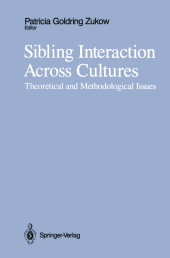 Neuerscheinungen 2012Stand: 2020-01-07 |
Schnellsuche
ISBN/Stichwort/Autor
|
Herderstraße 10
10625 Berlin
Tel.: 030 315 714 16
Fax 030 315 714 14
info@buchspektrum.de |

Patricia G. Zukow
Sibling Interaction Across Cultures
Theoretical and Methodological Issues
Herausgegeben von Zukow, Patricia G.
Softcover reprint of the original 1st ed. 1989. 2012. xvi, 207 S. XVI, 207 pp. 235 mm
Verlag/Jahr: SPRINGER, BERLIN 2012
ISBN: 1-461-28146-6 (1461281466)
Neue ISBN: 978-1-461-28146-7 (9781461281467)
Preis und Lieferzeit: Bitte klicken
Sibling Interaction Across Cultures is a collection of studies focusing on the role siblings play in the social, emotional, and cognitive development of their younger siblings. Unlike much previous research on sibling relationships, these studies share the underlying assumption that social interaction plays a significant role in the acquisition and transmission of cultural knowledge and social understanding. The contributors evaluate the advantages as well as limitations of current methodological issues directly affecting sibling research and assess the various theoretical perspectives underpinning these methodologies. Drawing from empirical, cross- and infra-cultural research, this volume lays new groundwork for identifying universal, environmental, and culture-specific aspects of the role of siblings in child development.
1 Communicating Across Disciplines: On Integrating Psychological and Ethnographic Approaches to Sibling Research.- History of This Collection.- Epilogue.- I The Relation Between Larger Cultural Goals and Socialization.- 2 Comparing Sibling Relationships Across Cultures.- Contemporary Importance of Sibling Research.- Universals in Sibling Research.- Comparing Sibling Relationships Across Cultures: Activity Settings as a Unit for Comparative Study.- Ecocultural Influences on Sibling Activity.- Sibling Activity Settings and Literacy: An Example from Hawaii.- Conclusion.- 3 Trust in the Mandinka Way: The Cultural Context of Sibling Care.- Theoretical Background.- Sample and Methods.- The Sibling Relationship as Cultural Context.- Caregiving: The Basic Routine.- The Appearance of Care.- Management Strategies: Manené and Threat.- Bounty and Blows.- The Adult World and the Field of Potential.- Siblings as Socializing Agents.- Conclusions.- 4 The Role of Sibling Interaction in Child Socialization.- The Ethnographic Study of Socialization.- Sample and Methods.- Kwara´ae Family Organization and Work.- The Role of Caregiver-Infant Interaction Strategies in Shaping Sibling Relationships.- Siblings as Caregivers and Peers.- Discussion.- II The Emergence of Cultural Knowledge: Social, Emotional, and Cognitive.- 5 Siblings as Effective Socializing Agents: Evidence from Central Mexico.- A Social-Interactive and Perceptual Approach to Socializing Child Novices.- Siblings as Socializing Agents.- Evidence from Central Mexico.- Discussion.- 6 Siblings and the Development of Social Understanding in Early Childhood.- Conflict.- Comforting, Sharing, and Cooperation in Play.- Conversations About Feelings.- Individual Differences.- Conclusion.- 7 Sibling Interaction, Birth Spacing, and Intellectual/Linguistic Development.- Mother-Infant Interaction and Early Intellectual and Linguistic Development.- Siblings´ Role in Intellectual Development.- The Vermont Family Studies Project.- Methodological Overview.- Infant Intellectual Development and Firstborn-Created Macrobehavioral Experiences.- Infant-Sibling Communication, Birth Spacing, and Intellectual and Linguistic Development.- Birth Spacing and Family Structure.- Discussion and Conclusion.- III Perceptions of the Sibling Role.- 8 The Child´s Perspective of Sibling Caretaking and Its Relevance to Understanding Social-Emotional Functioning and Development.- Empirical Direction for Future Sibling Research.- Method.- Results.- Summary.- 9 Children´s, Parents´, and Observers´ Perspectives on Sibling Relationships.- Children´s Perceptions of Their Relationships.- Different Perspectives on Sibling Relationships.- Empirical Illustrations of Different Perspectives.- Conclusion.- 10 Sisters and Brothers.- Contrastive Views.- Functions, Roles, and Activities.- Sisters and Brothers as Culture Brokers.- Siblings as Social Teachers.- Renvoi.- Author Index.


